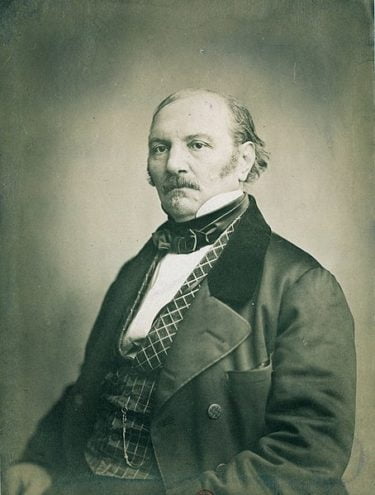The origins of modern spiritualism, the belief that the dead can talk to the living through the agency of specially gifted persons called ‘channelers’ or ‘mediums’, are usually traced to the town of Hydesville, New York, in 1848, when two teenagers, Maggie and Kate Fox, began communicating with a ghost. Decades later, both sisters would, at several occasions, confess to fraud and denounce the movement they had unwittingly started, but with little to no effect on its popularity.
Existing initially in the crossroads between religion and science – often seen as a source of empirical, scientific validation for beliefs that are tenets of several religious and metaphysical systems, such as the survival of the personality after bodily death – spiritualism, in the English-speaking world at least, later fragmented into a variety of populist religious cults or crowd-driving spectacles, not too different from the faith healing business, and similarly plagued by shady operators and exploitative practices. Meanwhile, the most scientifically-minded wing of the movement divested itself, at least in public, from the metaphysical pretensions of their forebears to found the field of parapsychology.
In Brazil, however, things happened quite differently: here when spiritualism fragmented, one aspect – called “spiritism”, “Kardecism” or “Kardecist spiritism” – supplanted all others, and was embraced by relevant members of the intellectual and professional elites – including medical doctors, lawyers, judges, politicians. This became the main nexus of Brazilian pseudoscience, incorporating ufology, parapsychology, faith healing and all kinds of “magnetic”, “energy-based” alternative medicines.

Kardecism takes its name from Allan Kardec, the pseudonym of French writer and educator Hippolyte Rivail (1804-1869), who wrote extensively on the subject, building a “spiritist doctrine” all of his own, including successive reincarnations and the progression of the soul. Kardec ideas were influenced by the “animal magnetism” of the 18th century Mesmerists, and by Swedish theologian Emanuel Swedenborg’s (1668-1772) supposed conversations with spirits from other planets.
Kardec’s ideas failed to impress most of the spiritualists of his time – the Scottish medium D.D. Home (1833-1886), a veritable “rock star” of the Victorian spiritualist scene, described them as “delusions” and “fantasies” – but they took root in Brazil and went through a very Brazilian process of syncretism, the fusion of diverse doctrines into very nimble ideological chimeras.
For instance, one of the main proponents of Brazilian Kardecism, the medical doctor Bezerra de Menezes (1831-1900) left a posthumous psychiatric tract, “Insanity Under a New Prism”, saying that mental disorders that occur without a noticeable brain lesion should be attributed to spiritual interference. The book ends with a letter supposedly written by the ghost of Samuel Hahnemann (1775-1779), the creator of homeopathy. As a result, in the late 19th century, it was common for spirit mediums in Brazil to prescribe homeopathic medicine while in trance.
During the 20th century, Kardecist syncretism mingled with ufology (UFOS and aliens could be manifestations of extraterrestrial spirits of Swedenborgian inspiration), alternative medicine (homeopathy, and acupuncture), faith healing (transfers of “energy” to patients via hand-waving, not unlike reiki or therapeutical touch, and the more dangerous psychic surgery), parapsychology (the canonical book on the investigation of poltergeists in Brazil, by Hernani Guimarães Andrade (1913-2003) is a spiritist work), and even jurisprudence.
The mainstreaming of this brand of supernatural belief goes so far that there is a lively debate in Law schools and courts about the admissibility of “psychic-graphed” material, that is, letters written by a medium while possessed by a dead person, as evidence in murder trials: at least one accused murderer was acquitted by the jury after the victim testified on her behalf, right from the Great Beyond.

When the Brazilian dictatorship of 1964-1985 came to an end and the country drafted a new democratic Constitution, spiritists were on the forefront of the effort to institutionalise alternative medicine in the healthcare system. Spiritists leaders demanded “a New Epistemology for a New Republic”, and the First International Congress on Alternative Therapies that took place in São Paulo in February, 1985, was a de facto spiritist Congress. If Brazil was to have political freedom, why not epistemic freedom? So now, 36 years on, we have 29 complementary and alternative therapies paid for with government funds.
The problem with epistemic freedom is that we can’t vote to decide if an antibiotic works or not, we have to test it in rigorous clinical trials. And if the trials show that the antibiotic works, it doesn’t matter how you feel about it, or if you don’t believe in it: it will work regardless.
When the scientific method is criticised for not being a perfect method, we can draw a useful comparison with democracy: we know democracy is not perfect, as sometimes authoritarian or incompetent governments get elected, but it’s the best system we have so far. Similarly, science is the best system we have for testing hypothesis and developing technologies and therapies that actually work.
However, the overall feeling of freedom in our young Brazilian democracy back in the 1980s may have given rise to an environment where, as Isaac Asimov puts it: “Anti-intellectualism has been a constant thread winding its way through our political and cultural life, nurtured by the false notion that democracy means that my ignorance is just as good as your knowledge.”
In this environment, alternative medicine flourished. Endorsed by both public opinion and religious sentiment, it quickly gained official recognition as medicine, and went unchallenged for several decades. Very few questioned its presence in our public healthcare system, and soon alternative therapies were introduced in Medical Schools and private healthcare. Speaking against alternative medicine was considered “scientism”, and disrespectful towards the wisdom of “the people”.
Such a mindset strongly impacts how a society reacts to evidence-based medicine. It’s no wonder Brazil has been the hub of miracle cures during the pandemic. Magical thinking extends from homeopathy to chloroquine, ivermectin, nitazoxanide, and all sorts of bogus ‘cures’ currently endorsed and promoted by our Ministry of Health.
The arguments are the same ones endorsed by the “epistemic democracy” of the 80’s: the valuing of anecdotal evidence, the inversion of the burden of proof demanding that scientists prove that these treatments don’t work, the misuse of the old trope “the absence of evidence is not evidence of absence”.
Our history with spiritism and alternative medicine shows that we have a long way to go if we want to promote science literacy. It’s not just an issue of explaining how science works, but of understanding decades of cultural habits and religious beliefs that got mixed up with science and medicine, and worse, religion disguised as science. The epistemic exceptionalism of science exists for a reason: science-based therapies can be proven to work.



